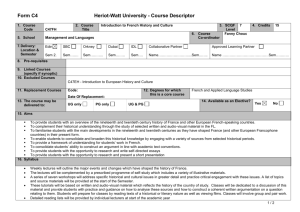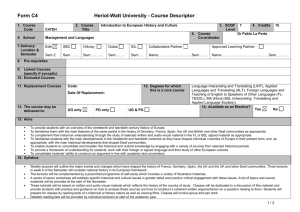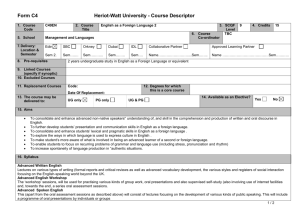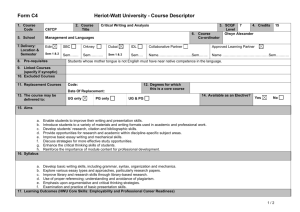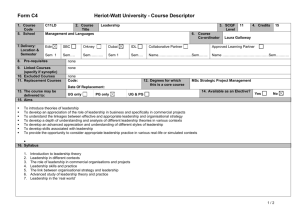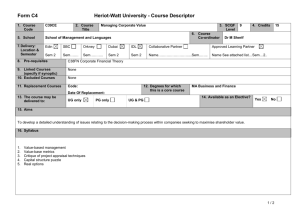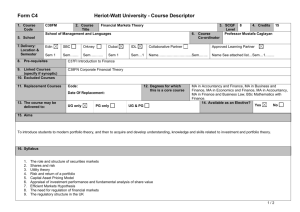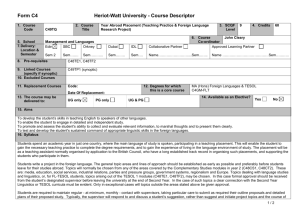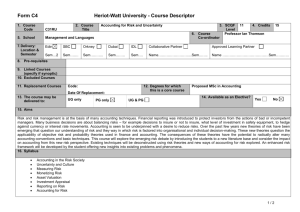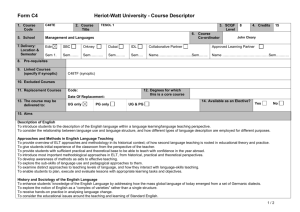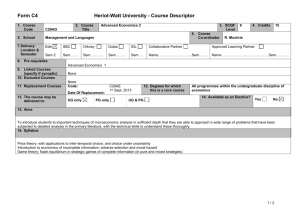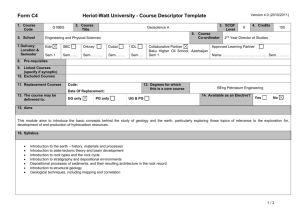C47GH_C4 - Heriot
advertisement
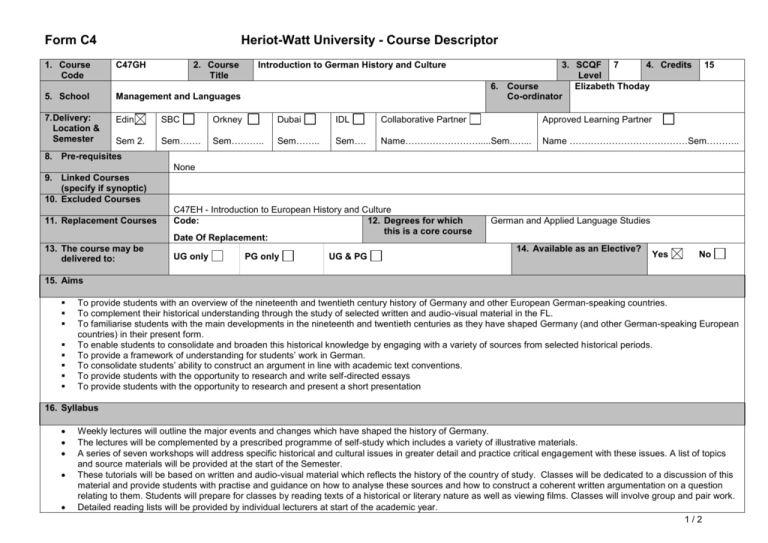
Form C4 Heriot-Watt University - Course Descriptor 1. Course Code C47GH 2. Course Title Introduction to German History and Culture 3. SCQF 7 4. Credits Level 6. Course Elizabeth Thoday Co-ordinator 15 5. School Management and Languages 7. Delivery: Location & Semester Edin SBC Orkney Dubai IDL Collaborative Partner Approved Learning Partner Sem 2. Sem……. Sem……….. Sem…….. Sem…. Name…………………….....Sem..…... Name …………………………………Sem……….. 8. Pre-requisites None 9. Linked Courses (specify if synoptic) 10. Excluded Courses 11. Replacement Courses C47EH - Introduction to European History and Culture Code: 12. Degrees for which this is a core course Date Of Replacement: 13. The course may be delivered to: UG only PG only UG & PG German and Applied Language Studies 14. Available as an Elective? Yes No 15. Aims To provide students with an overview of the nineteenth and twentieth century history of Germany and other European German-speaking countries. To complement their historical understanding through the study of selected written and audio-visual material in the FL. To familiarise students with the main developments in the nineteenth and twentieth centuries as they have shaped Germany (and other German-speaking European countries) in their present form. To enable students to consolidate and broaden this historical knowledge by engaging with a variety of sources from selected historical periods. To provide a framework of understanding for students’ work in German. To consolidate students’ ability to construct an argument in line with academic text conventions. To provide students with the opportunity to research and write self-directed essays To provide students with the opportunity to research and present a short presentation 16. Syllabus Weekly lectures will outline the major events and changes which have shaped the history of Germany. The lectures will be complemented by a prescribed programme of self-study which includes a variety of illustrative materials. A series of seven workshops will address specific historical and cultural issues in greater detail and practice critical engagement with these issues. A list of topics and source materials will be provided at the start of the Semester. These tutorials will be based on written and audio-visual material which reflects the history of the country of study. Classes will be dedicated to a discussion of this material and provide students with practise and guidance on how to analyse these sources and how to construct a coherent written argumentation on a question relating to them. Students will prepare for classes by reading texts of a historical or literary nature as well as viewing films. Classes will involve group and pair work. Detailed reading lists will be provided by individual lecturers at start of the academic year. 1/2 Form C4 Heriot-Watt University - Course Descriptor 17. Learning Outcomes (HWU Core Skills: Employability and Professional Career Readiness) Subject Mastery Understanding, Knowledge and Cognitive Skills Scholarship, Enquiry and Research (Research-Informed Learning) Demonstrate a broad knowledge and understanding of German (European German-speaking) history and culture Show critical understanding of key historical theories, concepts and principles. Use a wide range of routine skills and some advanced skills associated with academic essay writing (data selection, argumentation, referencing, editing). Personal Abilities Acquire an awareness of the changing nature of history. Develop the ability to apply a systematic and critical assessment to historical texts and films. Develop the ability to identify and analyse historical problems and issues and to evaluate related arguments. Industrial, Commercial & Professional Practice Autonomy, Accountability & Working with Others Communication, Numeracy & ICT Work with others, taking account of own and others’ roles. Demonstrate ability to gather and sort information. Structure and make simple presentations. Learn appropriate historical register and vocabulary. Exercise initiative and independent thinking. Participate in teamwork, peer conversation and group activities (lectures and tutorials). Self-management skills fostered by the need to be committed to a purpose, to manage self-study effectively and to work to deadlines . Present information, complex ideas and arguments in a well- structured and coherent form (written/oral). Use presentation software to make simple presentations. Demonstrate the ability to understand and use appropriate diagrams and charts. 18. Assessment Methods Method 19. Re-assessment Methods Duration of Exam Weighting (%) Synoptic courses? Method (if applicable) Summative Assessment: 2 Written essays. Duration of Exam (if applicable) 30% and 30% n/a 1 presentation 10% 1 class test 30% If the student’s final mark falls below a D the Exam Board will identify elements that have been failed and ask the students to resit the appropriate elements. Students must obtain an average grade of D or more in their resits in order to pass. 20. Date and Version Date of Proposal Date of Approval by School Committee Date of Implementation Version Number 2/2 Diet(s)
